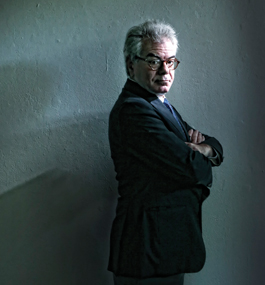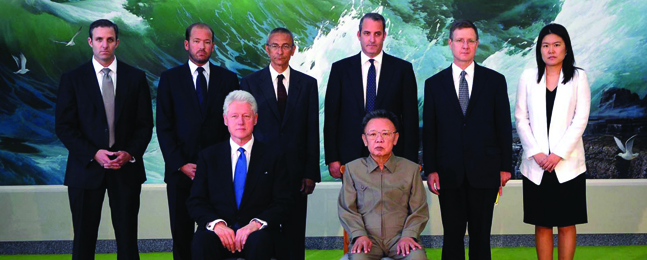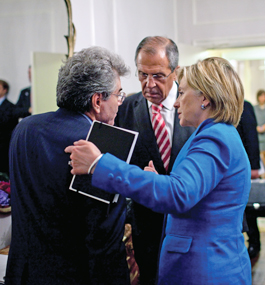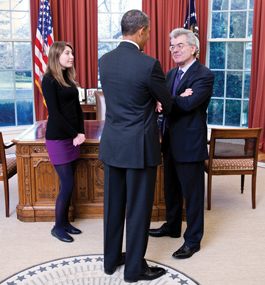Dean of Diplomacy
Gary Samore, the new head of the Crown Center for Middle East Studies, led U.S. efforts to halt nuclear proliferation over a decades-long career.

Mike Lovett
Gary Samore
by Lawrence Goodman
He’s stared down the toughest Russian arms-control negotiators. He’s briefed Presidents Bill Clinton and Barack Obama on nuclear proliferation. He’s helped pull America back from the brink of war with North Korea. He’s issued ultimatums to the Iranians.
Over a four-decade career, Gary Samore, newly appointed Crown Family Director of Brandeis’ Crown Center for Middle East Studies, has played a pivotal role in some of the most important U.S. arms-control agreements, knowing when to be a hard-liner, when to walk away from the negotiating table and when to invite a Russian adversary out for a corned-beef sandwich.
“I don’t think there’s anyone more expert in the world today than Gary” on nuclear weapons and disarmament, says Stanford political-science professor Michael McFaul, a former U.S. ambassador to Russia, who worked closely with Samore from 2009-13.
After earning a PhD in political science at Harvard while simultaneously working at the State Department on nonproliferation issues, Samore did a mid-’80s stint as a research analyst at California’s famed Lawrence Livermore National Laboratory, teaming up with leading nuclear physicists. By the time he joined the Clinton administration in 1996, he had a unique combination of deep technical expertise in nuclear weapons and extensive diplomatic experience.
“He had the perfect intellectual background,” says Robert Gallucci, MA’73, PhD’74, who worked with Samore on disarming North Korea in 1994. “He appeals to logic. He understands how to engage an adversary to go along with his position.”
In between his government jobs, Samore was executive director for research at the Harvard Kennedy School’s Belfer Center for Science and International Affairs, and vice president for global security and sustainability at the John D. and Catherine T. MacArthur Foundation. At London’s International Institute for Strategic Studies in the early 2000s, he authored a prescient paper casting doubt on the Bush administration’s claim that Iraq had a nuclear weapons program.
Now, as the Crown Center head, Samore, a professor of the practice of politics at Brandeis since 2018, aims to raise the profile of the 14-year-old center and increase its influence in Washington. The center recently announced a joint project with the Brookings Institution to connect researchers at the two organizations with U.S. policy experts.
Unlike doomsaying pundits, Samore is optimistic about the future of arms control. His years of negotiating with America’s archenemies have taught him to be.
North Korea, 1994
In June 1994, America and North Korea were perilously close to war. The Clinton administration, which had determined a year earlier that North Korea was building atomic weapons, was threatening to impose sanctions. Pyongyang said sanctions would be tantamount to an act of war and vowed to drown Seoul in a “sea of fire.” A surprise diplomatic visit to North Korea by former President Jimmy Carter pulled the U.S. and North Korea back from the brink, and both sides returned to the bargaining table.
In July, Samore traveled to Geneva, Switzerland, with the U.S. delegation, led by Gallucci. The talks took place mostly at the North Korean mission, a historic villa on the shores of Lake Geneva. Portraits of North Korea’s supreme leaders hung on the walls. The lapel pins the North Korean diplomats wore also featured images of the leaders.
The No. 2 member of the U.S. contingent, Samore got along well with his counterpart, Ri Yong-ho, now North Korea’s foreign minister (in 2017 he called President Donald Trump a “mentally deranged person” and “President Evil”). Samore says Ri was straightforward and funny. At a pizza and beer party at the North Korean mission, the two men talked about their families and their favorite movies.
By mid-October, the North Koreans had agreed to halt their nuclear weapons program in exchange for help with building nuclear power plants. But they refused the U.S. demand that they enter into talks with South Korea. This was a critical sticking point for the Americans. The U.S. Congress would never approve aid to Pyongyang for commercial nuclear power; South Korea and Japan would have to provide that support.
Between negotiating sessions, the Americans liked to play touch football on a field near the U.S. mission. During one match, word came that the North Koreans were ready to sign a final agreement. The U.S. team quickly changed into suits and rushed to the North Korean mission, which was filled with champagne chilling in ice buckets, bouquets of flowers in vases and hordes of reporters everywhere.

SIT-DOWN IN NORTH KOREA: Former President Bill Clinton meets with Supreme Leader Kim Jong-il in Pyongyang in August 2009.
page 2 of 4
But the North Koreans still refused to sit down with the South Koreans. They were hoping the party atmosphere and the journalists’ presence would create enough momentum to entice the Americans to cave rather than raise objections. “It was North Korea’s attempt to separate Washington and Seoul,” Samore says. The attempt failed. The U.S. walked out.
Within a week, the North Koreans had come around to the American position. The Agreed Framework, as the deal was called, was signed on Oct. 21.
The North Koreans again hosted a party. This time, both sides celebrated. At one point, snake wine, a traditional Korean drink, was served; a dead poisonous snake, its venom dissolved in the alcohol, lay at the bottom of the bottle. (The wine tasted like “alcoholic urine,” Samore remembers.)
Though hailed as a breakthrough at the time, the Agreed Framework soon unraveled. By 2000, the North Koreans were once again developing nuclear weapons.
Critics charge the Clinton administration let itself be duped and should never have trusted the North Koreans to comply with the treaty. But Samore says he always doubted the Framework could bring a permanent halt to Pyongyang’s nuclear ambitions. At one point during the talks, Ri told him, “Look, we’re a weak, poor country. We’re surrounded by enemies that are stronger than us. We have to have nuclear weapons.” Samore saw this as a tip-off the North Koreans wouldn’t relent in their quest for the bomb.
So why sign the agreement? Samore belongs to the realpolitik school of foreign policy. Diplomacy, he believes, achieves what’s possible. Because conflicts are frequently intractable and irresolvable, it very rarely achieves the ideal. Samore’s description of his approach in his dealings with Iran in a 2015 interview with the online publication Vox — “delay the problem, […] manage the problem, contain the problem” — sums up his approach to many global crises.
The Agreed Framework ended the imminent threat of hostilities between the U.S. and North Korea. The only other option for the U.S. — invading the Korean peninsula — would have risked millions of casualties. “The alternative was something or nothing,” Samore says. “We went with what was achievable.”
In 2019, it’s futile for the Trump administration to demand that North Korea give up its nuclear weapons, Samore believes. At least for the time being, America must get used to the idea of North Korea having nuclear weapons capable of reaching the West Coast.
“China and Russia have the same capacity, and we’ve learned to live with it,” he says. “Deterrence and defense — it’s not a happy affair, but it’s manageable. We can avoid nuclear war.”
Russia, 2009
Soon after joining the Obama administration in 2009, Samore and several other senior officials began meeting monthly with Russian ambassador Sergey Kislyak at his official residence, a Beaux Arts mansion decorated with artwork depicting historic Russian battles, a few blocks north of the White House. Over a lunch of caviar, pepper vodka from Kislyak’s native Ukraine and a French entree, the diplomats discussed nuclear weapons.
Samore says he found Kislyak to be “a very reliable and sophisticated person to talk to.” In recent years, Kislyak has come under suspicion because of his contact with several Trump officials during the 2016 presidential campaign, interactions that led NBC News to describe him as a “shadowy apparatchik.” But Samore says Kislyak, who returned to Russia in 2017, was never a master spy, just a savvy diplomat doing his job by getting to know important American political figures.
The Obama-era meetings with Kislyak were part of a larger charm offensive, designed to ease the Russians into arms control talks. The Russians still felt deeply humiliated by their defeat in the Cold War and were angry that, at least from their point of view, the Americans had rubbed it in their faces.
In late 2009, as Samore was preparing for the international Nuclear Security Summit, which sought to keep nuclear weapons out of terrorists’ hands, he ran into Anatoly Antonov, a senior Russian diplomat (now Russian ambassador to the U.S.), at a U.N. meeting. Samore sensed Antonov was worried about the summit. The Russians thought they might be singled out for failing to secure their nuclear stockpile and be forced to change their policies.
So Samore invited Antonov out to a New York deli for cream soda and corned-beef sandwiches. The U.S. and Russia were the two great nuclear superpowers, Samore told Antonov. They should work together to make the world a safer, better place. “It was a little bit of human kindness,” Samore says. “It reassured him we had good intentions.”

Courtesy the White House / Pete Souza
AWAY FROM THE TABLE: Samore, Russian Foreign Minister Sergey Lavrov and U.S. Secretary of State Hillary Clinton confer during a September 2009 bilateral meeting with the Russians in New York City.
page 3 of 4
Around this time, the U.S. and Russia also entered negotiations on the New START arms control treaty, the successor to the about-to-expire 15-year-old START I pact. At the outset, the Russians demanded the negotiations include America’s missile defense system, not just its offensive nuclear weapons.
Samore didn’t agree. “Gary took the firm view that we were not going to let missile defense constraints seep into the discussions,” says McFaul. “He was always a hard-liner on that.”
Obama, who chose to become intimately involved in the New START talks, wanted Samore and McFaul to update him constantly. Chief of staff Rahm Emanuel saw them waiting outside the Oval Office so often he nicknamed them Cheech and Chong.
Samore calls Obama “a pretty cool customer,” not “a warm person,” but says he respected him immensely. “I’ve never seen anybody who could learn and remember details from oral briefings the way Obama could,” he says. He recalls giving Obama a highly detailed, technical report on the progress of the talks with Russia, then marveling as the president repeated his words verbatim in a meeting with senators two weeks later.
In an approach highly unusual for a president, Obama hammered out many of the New START details himself in face-to-face meetings with then Russian President Dmitry Medvedev. This was possible, Samore says, only because of Obama’s deep grasp of the issues.
New START, officially signed in April 2010, represented a high point in what the Obama administration called its “reset” policy with Russia. After President George W. Bush’s frosty relationship with Russia, the new administration welcomed the rapprochement. U.S. officials were especially hopeful that Medvedev would prove more pro-Western than his predecessor, Vladimir Putin, who had stepped aside to become prime minister.
Samore never bought into reset. “I thought Obama was too optimistic,” he says. After poring over U.S. intelligence and internal Russian military documents, Samore had concluded Russia still saw America as a major threat. Though it might be possible to cooperate with Russia on discrete issues, a long-term alliance would not happen under the current Russian leadership.
“The Russians were fixated on the idea that we could attack them with nuclear weapons and then use our missile defense system to mop up whatever residual forces survived the first attack,” Samore says. “It was all crazy stuff, but the Russians believed it.”
Samore also correctly pegged Medvedev as a Putin puppet. In fact, Putin did reassert his control in 2012 and adopted a strong anti-Western stance.
Still, New START remains a significant achievement. It reduced the number of U.S. and Russian deployed strategic nuclear warheads and bombs by 30%. It imposed a verification system that, as Samore says, “gives both countries some confidence the other side isn’t secretly building up their nuclear forces.”
Trump has reportedly called New START “a bad deal.” Earlier this year, he pulled out of the 1987 Intermediate-Range Nuclear Forces Treaty. He’s also indicated he wants to renegotiate New START, and this time include China in the discussions.
Scrapping the INF accord isn’t cause for alarm, says Samore. U.S. intelligence agencies know Russia has been violating it, and the treaty limits only a small portion of the U.S. and Russian arsenals.
As for New START, Samore thinks Trump’s efforts to involve China will be futile. Because its nuclear arsenal is so dwarfed by the U.S. and Russian arsenals, China would never agree to forgo building more nuclear weapons; such an agreement would effectively lock in its inferiority.
More important, New START enjoys considerable support within the Departments of State and Defense. Officials there will convince Trump to preserve the treaty in the interest of reducing the risk of nuclear war, Samore predicts.
For his part, Samore supports extending New START to 2026 while the U.S. negotiates a new treaty with the Russians that takes into account changes in weapons technology and both sides’ strategic interests.

Courtesy the White House / Lawrence Jackson
FOCUSED: Samore (right), who became President Barack Obama’s “WMD czar,” concentrated on one objective: keeping nuclear weapons out of Iranian hands.
page 4 of 4
Iran, 2009-13
In 2009, Obama appointed Samore the White House coordinator for arms control and weapons of mass destruction, “WMD czar” for short.
“Ignore the title,” Samore told The New York Times’ David Sanger. “My job comes down to a single thing — to keep Iran from obtaining a nuclear weapon.”
Samore never warmed to Iran’s diplomats the way he did to North Korea’s and Russia’s. For starters, he thought they weren’t telling the truth when they claimed they were enriching uranium for nuclear energy, not weapons. They also bragged incessantly about the greatness of Iranian civilization. There were only so many times he could hear about Persia’s role in inventing chess, he says.
The only upside, Samore says, was that the Iranian diplomats were susceptible to flattery, though that was less true once they’d committed to a position.
Saeed Jalili, an arch-conservative who’d lost a leg in the Iran- Iraq War in the 1980s, was Iran’s chief negotiator in multilateral talks involving the U.S., the U.K., France, Germany, Russia and China. At negotiating sessions, he’d hold press conferences at which he spoke for an hour or more. “He was under instructions to go to these meetings and not negotiate,” Samore says. “The way he dealt with that was by giving very long speeches. Everybody got fed up with listening to him.”
In 2011, at a session in Istanbul, Samore proposed to one of Iran’s deputy negotiators, Ali Asghar Soltanieh, that the U.S. and Iran meet for negotiations. Soltanieh came back the next day and said he was not authorized to begin bilateral talks.
According to Samore, the Iranians’ intransigence hurt them badly, enabling Obama to marshal support for international sanctions. “We went to the Russians, the Chinese and everybody else, and said, ‘Look the Iranians aren’t serious. They won’t even meet with us,’” Samore says. “It strengthened our position.”
His dealings with the Iranians were “four years of futile and frustrating negotiations,” filled with “tiring, tedious discussions, posturing and gamesmanship,” says Samore.
After leaving the White House in 2013, Samore became president of United Against Nuclear Iran, a bipartisan group of foreign-policy luminaries committed to keeping Iran from becoming a nuclear power.
In spring 2015, after a year of talks, the U.S. was poised to sign a pact with Iran, the so-called Joint Comprehensive Plan of Action. Iran would curb its nuclear program in return for an end to sanctions.
Samore and other UANI members issued a position paper urging Obama to put off finalizing the agreement and negotiate a tougher deal. They called for stricter monitoring and inspections, and quick punishment if Iran violated the agreement. “Without these features,” Samore and the other signatories wrote, “many of us will find it difficult to support a nuclear agreement with Iran.”
Although many of the recommendations were eventually included in the agreement, UANI still came out against the JCPOA. At this point, Samore quit.
After some consideration, his practical side prevailed, and he decided the JCPOA was the best deal the U.S. could get. In his 2015 interview with Vox, he called the pact “solid” and gave it a “passing grade.” “I’m skeptical that we can reject this agreement and negotiate a substantially better deal within any kind of reasonable time frame,” he said.
Last year, Trump pulled the U.S. out of the JCPOA and reinstated crippling sanctions. There’s widespread fear Iran will resume its quest for nuclear weapons. In June, as the two sides escalated tensions, there was even talk of war.
Nonetheless, Samore is optimistic. He predicts Iran won’t rush to build nuclear weapons. If Iran scrapped the JCPOA, other countries might impose sanctions, further damaging the Iranian economy. Or there could be war. So Iran “will hunker down and weather the storm in the hopes that President Trump will not be reelected,” Samore says.
Two decades ago, experts predicted more than 20 countries would soon have nuclear weapons. Today, only nine nations have them. Nor has the threat of terrorists obtaining weapons of mass destruction materialized.
“We’re in much better shape now than we’ve ever been,” Samore says.
